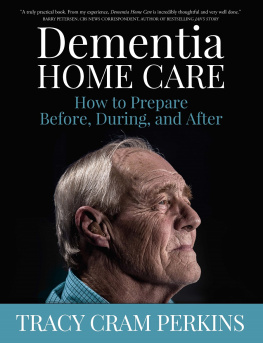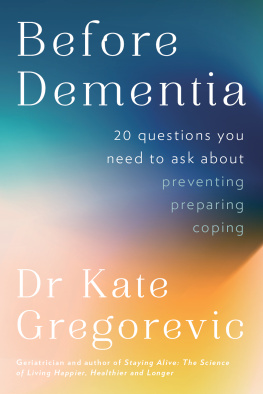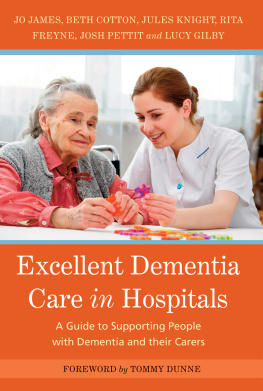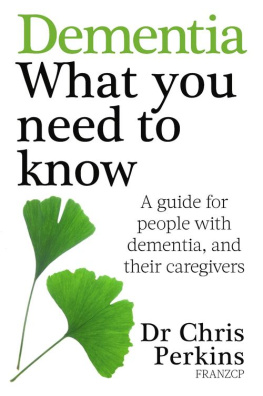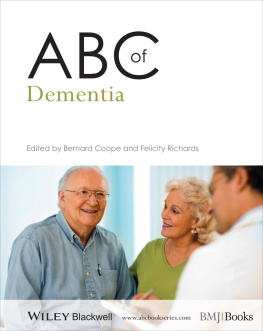Dementia
HOME CARE
How to Prepare
Before, During, and After
TRACY CRAM PERKINS

USA
Behler Publications
Dementia Home Care
A Behler Publications Book
Copyright 2021 by Tracy Cram Perkins
Cover design by Yvonne Parks - www.pearcreative.ca
Back cover photography by Mark Bennington
Recipes by Cathy Russell
All rights reserved. No part of this book may be reproduced or transmitted in any form or by any means, electronic or mechanical, including photocopying, recording, or by any information storage and retrieval system, without the written permission of the publisher, except where permitted by law.
Some names have been changed to protect their privacy.
Library of Congress Cataloging-in-Publication Data
Names: Perkins, Tracy Cram, author.
Title: Dementia home care : how to prepare before, during, and after / Tracy Cram Perkins.
Description: Lake Jackson : Behler Publications, [2021] | Includes bibliographical references and index. | Summary: Comprehensive A-Z examination of the role of care giver for Alzheimers/Dementia patients that offers help with making informed decisions about in-home care giving-- Provided by publisher.
Identifiers: LCCN 2020052025 (print) | LCCN 2020052026 (ebook) | ISBN 9781941887127 (paperback) | ISBN 9781941887134 (epub)
Subjects: LCSH: Dementia--Patients--Care. | Alzheimers disease. | Dementia--Patients--Family relationships.
Classification: LCC RC521 .P4245 2021 (print) | LCC RC521 (ebook) | DDC 616.8/31--dc23
LC record available at https://lccn.loc.gov/2020052025
LC ebook record available at https://lccn.loc.gov/2020052026
Print ISBN: 9781941887127
Ebook ISBN: 9781941887134
Dedication
This book is dedicated to my father, Eldon, who taught me how to rebuild my first car, who taught me how to fish, who could never convince me vanilla ice cream was the ultimate flavor because you secretly loved strawberry, and who continued to teach me up to the very end. Thank you for the time you spent with me and for asking the question, I have Alzheimers, not the plague. What will it take to be treated like a human being? Thats all Im asking.
Acknowledgments
My beta readers, Johanna Flynn, Lisa Knight, Julie Cooper, Sharon Jackson, Venetia Runnion, Wendy Kendall, Andrea Ball, Cathy Russell, Karen Munger, Vickie Barrier, Indy Quillen, Debi Canales, Steve Wilkendorf, Lori Ann Nelsen-Allen, Teri Choate, Lindsay Pierce, Nancy Conway, and Debbie Moffett, your input made this book what it is today. Without your help this book would not have been possible.
The Lodge Ladies: Andrea Finchum, Gail Galloway, Kim Governor-Sproul, Susan Hamilton Wolfe, Wendy Jackson, and Nancy Forst English for your unwavering support. Kristina Younger for her lifetime support. Matt Hawkins and Eli Hawkins for sharing the caregiving. Gail Cram for her sisterly support and suggestions. My sister, Sandy Murphy, for being my biggest cheerleader. Beverly Cram for being with me through it all for her little brother.
Shere Landers for the tips on treating hypothermia. Vanessa Palensky for tips on distraction techniques. Ursula Nicol for tips using the warm blankets.
Thank you, Lynn Price, my editor, for your faith and support on this project.
To the women who taught me and inspired me through their books and videos: Jolene Brackey, Joanne Koenig Coste, Paula Spencer Scott, and Teepa Snow.
To my husband, Daniel, who shared this journey with me, who inspired me to write these pages, and who gave me the emotional support to cross the finish line. You are my once in a lifetime.
Chapter 1: Introduction
We all look for quick answers and shortcuts. Especially when we are under great stress. This book is for anyone who is struggling to care for someone with dementia. It contains what-can-I-try-in-this-moment tips you can use whether you are caring for your family member or friend.
Each persons journey is different. The road of dementia care will change every aspect of your life and theirs. Dementia is like playing Hide and Seek: Ready or not, here I come.
None of us saw dementia barreling down the hill at us like a Mack truck with no brakes, because it arrived slowly with plausible explanations for everything. Only when we look back do we see the mounting evidence.
No two people experience dementia the same way. No two family members will care for a loved one with dementia the same way. Caring for someone with dementia is one of the most stressful burdens a person can ever accept. We have more training to drive a car, operate a smart phone, or boil water than we do to take care of someone who is saying the long goodbye.
Unlike a day job, with dementia care there are no vacations, no pay raises, no glowing performance reviews. Unlike raising a child, there is no first day of kindergarten, no graduations, no weddings to look forward to.
My journey started when my younger sister called to tell me our father reached his tipping point and didnt have the health to continue caring for our mother. Our mother had cancer and the treatment caused her dementia. My husband and I decided I would quit my job and take over my mothers care. What I didnt know then was my father already traveled down the road of Alzheimers Disease. Alzheimers Disease is a great mimic, disguising itself as anything else, even from the person who has the disease. I didnt discover he had it for several more years.
I wasnt a caregiver. I didnt know the first thing about caregiving. I didnt have any medical training. I did know I needed help and lots of it.
The caregiver, thats youand me. You may think a caregiver is a person working at a skilled nursing facility who is trained and gets paid. Nope, we fall into the category. We tend to think of ourselves as wives, husbands, life partners, daughters, sons, friends, or extended family. You are a caregiver. Even if youre three thousand miles away and managing as much as humanly possible over the phone, you are still a caregiver. We are Americas largest health care provider, the unpaid family caregivers.
Dementia care is difficult. It requires patience, adaptability, and a strong back. From learning how to transfer someone who doesnt want a bath in and out of a tub to dealing with verbal abuse caused by delusions and paranoia. As the caregiver of my family, I know firsthand the depression and anxiety and guilt which comes with dementia care.
My biggest frustrations occurred when something happened with my father and I would vaguely remember reading about ways to take care of the issue but couldnt find it in any of the books on my bookshelf. Days after the event I would find the possible solutions when I was looking for something else. This book grew from not being able to find the information that should have been at the end of my tired, stressed-out fingertips.
I have organized this book with emphasis on the caregiver. Not everyone with dementia will present symptoms in the same order. The chapters are ordered with the general progression of the disease. In this way, you wont spend a lot of time searching for help, instead, you will spend a little time finding possible workable solutions.
Unlike other books in this arena, the chapter on laughter is at the front of this book. You will find it is one of the best tools in your toolbox. Not enough attention is paid to the therapeutic effects of laughter. My husband and I found the easiest ways to motivate my father involved joyous laughter. We made sure it was one of the last things he heard before he passed.
Laughter is not at all a bad beginning for a friendship, and it is far the best ending for one. -Oscar Wilde
Next page
